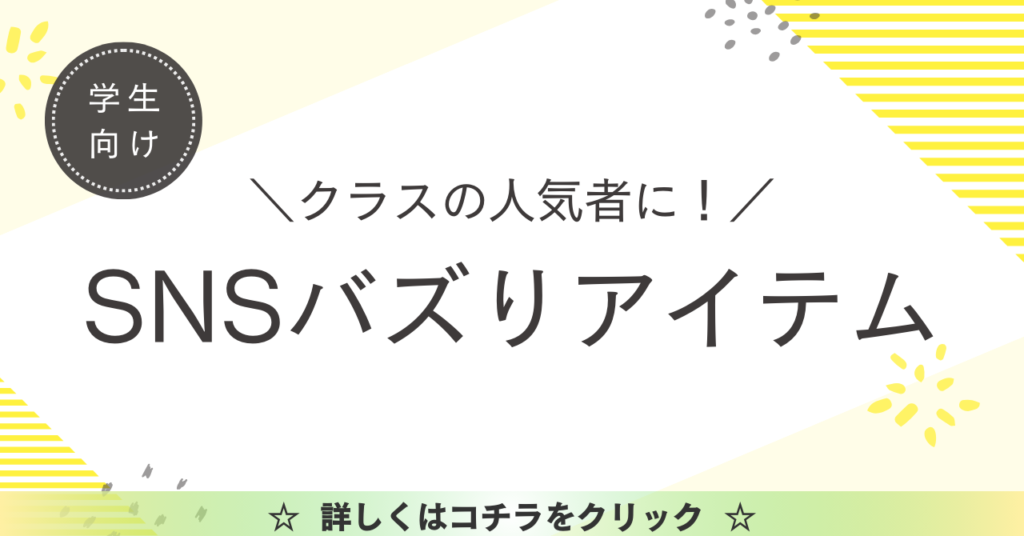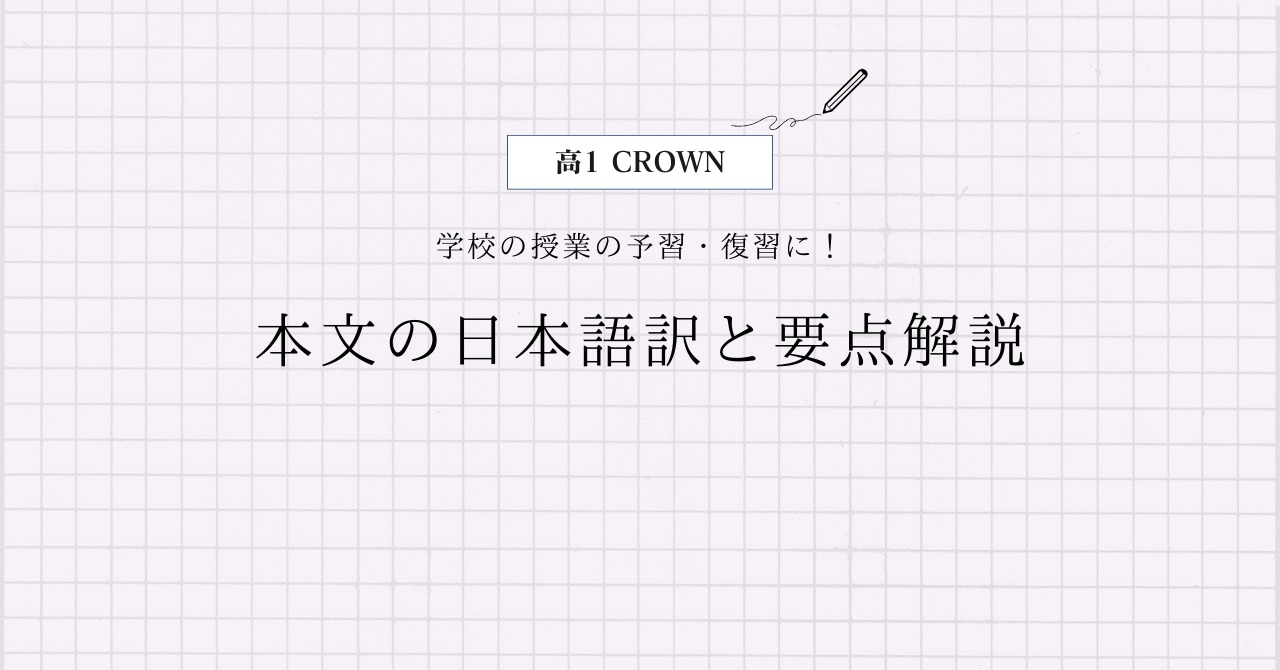三省堂 高1CROWN English Communication1 Lesson2 Section3の本文の日本語訳と重要箇所の解説です。
Section2-1, 2-2, 2-4の解説はこちらからご覧ください。
>高1CROWN English Communication1 Lesson2 Section1 本文和訳
>高1CROWN English Communication1 Lesson2 Section2 本文和訳
>高1CROWN English Communication1 Lesson2 Section4 本文和訳
- CROWN English Communication1 Lesson2 Section3 本文と日本語訳
- CROWN English Communication1 Lesson2 Section3 重要事項の解説
- KonMari is not telling us to throw out stuff ruthlessly.
- She treats her belongings like living things.
- One day, while she was in high school, she bought a new cell phone.
- Then she sent a message to her old phone:
- “You have been helping me for many years. Thank you.”
- Her old phone rang immediately, and she checked the text.
- She said to her old phone, “Great. My message reached you.”
- When she opened her old phone a little later, she was surprised to find a blank screen.
- Her old cell phone went dead after receiving her message.
- Its job was done.
- KonMari admits that this was probably just a coincidence.
- But it illustrates her idea:
- we should show respect to our belongings, even when we are throwing them away.
- We have a very close relationship with our belongings.
- CROWN English Communication1 Lesson2 Section3 まとめ
CROWN English Communication1 Lesson2 Section3 本文と日本語訳
KonMari is not telling us to throw out stuff ruthlessly.
「こんまりさんは私たちに物を容赦なく処分しなさいと言ってはいません。」
She treats her belongings like living things.
「彼女は持ち物を生き物のように扱います。」
One day, while she was in high school, she bought a new cell phone.
「ある日,彼女が高校生の間に,新しい携帯を買いました。」
Then she sent a message to her old phone:
「それから彼女は古い携帯にメッセージを送りました。」
“You have been helping me for many years. Thank you.”
『あなたは何年も私を助け続けてくれました。ありがとう。』
Her old phone rang immediately, and she checked the text.
「彼女の古い携帯がすぐに鳴って,彼女はテキストを確認しました。」
Of course, it was her message.
「もちろん,それは彼女のメッセージでした。」
She said to her old phone, “Great. My message reached you.”
「彼女は古い携帯に,『良かった。私のメッセージがあなたに届いた。』と言いました。」
Then, she closed it.
「それから,古い携帯を閉じました。」
When she opened her old phone a little later, she was surprised to find a blank screen.
「少しした後で古い携帯を開いたとき,彼女は何もない画面を見て驚きました。」
Her old cell phone went dead after receiving her message.
「古い携帯は彼女のメッセージを受け取った後,使えなくなりました。」
Its job was done.
「仕事が終わったのです。」
KonMari admits that this was probably just a coincidence.
「こんまりさんは,このことは多分ただの偶然だったと認めています。」
But it illustrates her idea:
「しかし,それは彼女の考えを説明しています。」
we should show respect to our belongings, even when we are throwing them away.
「私たちは持ち物を捨てているときでさえ,持ち物に対して敬意を示すべきです。」
We have a very close relationship with our belongings.
「私たちは持ち物ととても深い関係を持っているのです。」

CROWN English Communication1 Lesson2 Section3 重要事項の解説
KonMari is not telling us to throw out stuff ruthlessly.
この文は「現在進行形」の否定文になっていますね。
“tell 人 to 動詞の原形”で「人に~するよう言う」という重要表現です。
“throw out”は「を投げ捨てる,処分する」という意味で,“stuff”は「物,材料」という名詞,“ruthlessly”は「情け容赦なく」という副詞になります。
She treats her belongings like living things.
“treat”は「を扱う」という動詞で,“belongings”は「持ち物,所有物」という名詞です。ふつう複数形で使います。
“like”は「~のような」という前置詞で,“living things”は「生き物」という名詞ですね。
One day, while she was in high school, she bought a new cell phone.
“one day”は「ある日」という意味ですね。
“while”は「~の間」という接続詞です。“while”を使うときは,主語とbe動詞が省略されることも多いですよ!
“cell phone”は「携帯電話」という名詞になります。
Then she sent a message to her old phone:
“then”は「それから,そのとき,それでは」といった意味の副詞です。文に応じて柔軟に訳してあげてください。
“send もの to 人”は「人にものを送る」という重要表現で,“send 人 もの”にも書き換え可能です。
“You have been helping me for many years. Thank you.”
この文は「現在完了進行形」になっていますね。
“for many years”は「何年もの間」という意味になります。
Her old phone rang immediately, and she checked the text.
“rang”は“ring(鳴る)”の過去形で,“immediately”は「すぐに」という副詞です。
“check”は「を確認する」という動詞で,“text”は「テキスト,文章」という名詞になります。
She said to her old phone, “Great. My message reached you.”
“say to 人”で「人に言う」という意味ですね。
“reach”は「に達する,届く」という動詞です。
When she opened her old phone a little later, she was surprised to find a blank screen.
この文では「接続詞when」が使われていますね。
“a little”は「少し」,“later”は「後に,その後」という副詞になります。
“be surprised”で「驚く」という表現で,“to find”は驚いた理由を表す「不定詞の副詞的用法」になっています。
“blank”は「空白の,何もない」という形容詞で,“screen”は「画面,スクリーン」という名詞です。
Her old cell phone went dead after receiving her message.
“go dead”で「(機械が)故障する,切れる」といった意味になります。今回は「使えなくなった」と訳しました。
“after”は「~の後で」という前置詞です。
“receive”は「を受け取る」という動詞で,ここでは「動名詞」になっていますね。
Its job was done.
“Its”は“Her old cell phone”を指しています。
“done”は「終わった,完了した」という形容詞になります。
KonMari admits that this was probably just a coincidence.
“admit”は「を認める」という動詞になります。後ろには「接続詞that」が付いていますね。
“probably”は「多分,おそらく」,“just”は「ただ~だけ,ちょうど」という副詞ですね。
“coincidence”は「偶然」という名詞になります。
But it illustrates her idea:
“it”はここまでの一連の出来事を指していますね。
“illustrate”は「を説明する」という動詞です。
we should show respect to our belongings, even when we are throwing them away.
“should”は「~すべきだ,~のはずだ」という助動詞です。
“show 人 もの”で「人にものを示す,見せる」となって,“show もの to 人”でも同じ意味になります。
“respect”は「敬意,尊敬」という名詞です。
“even when”は「~なときでさえ」という「接続詞when」を強調した表現になります。
“throw A away”は「Aを捨てる」という意味で,“them”は“our belongings”を指していますね。
We have a very close relationship with our belongings.
“close”は「親しい,近い」という形容詞で,“relationship”は「関係性」という名詞です。
“relationship with~”で「~との関係」という意味になります。
CROWN English Communication1 Lesson2 Section3 まとめ
以上がCROWN English Communication1 Lesson2 Section3の日本語訳となります。
「接続詞」や「完了形」の使い方をしっかり確認しておきましょう!
>高1CROWN English Communication1 Lesson2 Section1 本文和訳
>高1CROWN English Communication1 Lesson2 Section2 本文和訳
>高1CROWN English Communication1 Lesson2 Section4 本文和訳
何か分からない点や他に解説してほしい点があれば,お気軽にコメントしてください!




コメント
三省堂のCrown English communication 1Lesson3の和訳・解説もお願いしたいです!
(Hatching the Egg of Hope)
CrownはLesson10まで和訳・解説ページをアップしてありますよ!